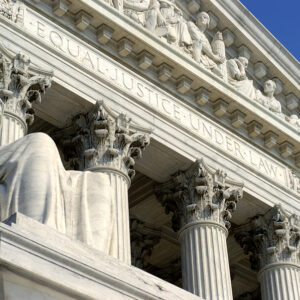A favorite sport in the hours and days after the Supreme Court hears arguments in a case is guessing how the justices will rule. It can be a humbling exercise.
Yet, in response to recent oral arguments in Groff v. DeJoy, one thing may be certain: The court will address and adjust a decades-old decision from a case that has thwarted religious liberty protections for American employees ever since. The question is how far the court might go in restoring religious liberty to the workplace.
Gerald Groff is a former postal employee from rural Pennsylvania who joined the U.S. Postal Service because it fit his desire to have a career that allowed him to not work on Sundays. When he joined the USPS, it didn’t deliver on Sundays. The job seemed a perfect fit.
That was until Amazon purchased a contract requiring the USPS to deliver packages on Sundays.
At first, Groff’s supervisor accommodated him. Groff was willing to work extra shifts and holidays to help out his fellow employees, who then covered for him on Sundays when, for religious reasons, he could not work. But, in a sudden shift, USPS officials ended his accommodation. He transferred to a different post office that was not required to make deliveries on Sunday — losing all his seniority in the process — but that soon ended, and USPS began increasing pressure on Groff to abandon his religious convictions.
USPS set out to make an example of Groff. He faced eight disciplinary hearings, received two separate suspensions, and a warning letter went to his employee file, all while supervisors and co-workers mocked his religious convictions. After two years of relentless hostility, Groff felt he had no choice but to resign.
No American should be forced to choose between their faith and their job.
So, Groff filed a lawsuit, with his case eventually making it to the Supreme Court, where in mid-April the justices heard vigorous oral arguments for two hours.
At issue is whether the court’s 1977 decision in Trans World Airlines v. Hardison correctly defines “undue hardship” under Title VII of the Civil Rights Act. Will it continue to excuse employers from accommodating religious employees if doing so means more than a “de minimis,” or minimal, burden on the employer? Or will the court extend similar protections offered to disabled employees to the nation’s religious employees?
Groff v. DeJoy provides an opportunity for the court to restore the meaning Congress intended in Title VII’s protections for religious employees before lower courts watered it down.
It seemed clear during oral argument that a majority of the justices seem willing to jettison the “de minimis” holding of Hardison. Justice Neil Gorsuch stated, “I think there’s common ground too that de minimis can’t be the test, in isolation, at least, because Congress doesn’t pass civil rights legislation to have de minimis effect. Right?”
Gorsuch echoes the words of Justice Thurgood Marshall, who, in 1977, dissented in Hardison by saying, “An employer, the court concludes, need not grant even the most minor special privilege to religious observers to enable them to follow their faith.”
The question remaining for the justices is whether the court will refuse to grant even the most minor privileges to religious observers at work, or will it take a more fulsome view of our nation’s commitment to religious liberty? We will know by the end of June.
Indeed, whatever the court chooses to replace the ill-fated “de minimis” test will benefit from returning our national commitment to err on the side of what Marshall said was one of America’s “pillars of strength — our hospitality to religious diversity.”
Please follow DVJournal on social media: Twitter@DVJournal or Facebook.com/DelawareValleyJournal

